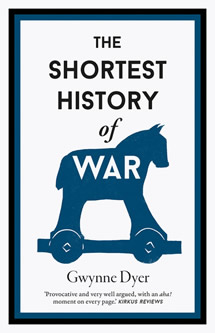Reviewed by Rama Gaind.
By Gwynne Dyer, Black Inc., $24.99.
 This is not a book to analyse another war. Instead, it’s about “how war as a whole works, and why we do it, and even how we might stop”.
This is not a book to analyse another war. Instead, it’s about “how war as a whole works, and why we do it, and even how we might stop”.
Gwynne Dyer, acclaimed historian and military expert, summarises the story of conflict from the dawn of man to the present age of atom bombs and algorithms. He examines the origins of war and what’s required if we want to abolish this ancient institution. He notes conflict is innate to human nature despite the peace much of the modern world now enjoys. Another significant question asked is what can be done to stop the wars of the future – with the looming threat of climate change and superpower rivalry.
War has always been a defining feature of human society, but opinions have turned against war as a way of doing business in many countries, though almost every nation still keeps an army.
“Significant progress has been made with no great power fighting another directly in three quarters of a century. The toll of war in lives lost and cities destroyed has fallen steeply since 1945, yet the weapons are still there. There are future probabilities that are not often discussed in public.”
That’s a good reason to re-examine the whole phenomenon of war, but most of us, though, are not very well informed about where war comes from or how it really works.
Hence, The Shortest History of War “is not a military history in the usual sense. It is a study of war as a custom and tradition, as a political and social institution, and as a problem”.
“Most, though, it’s a book about why we do this thing, and how we might stop doing it now that we really need to.”











